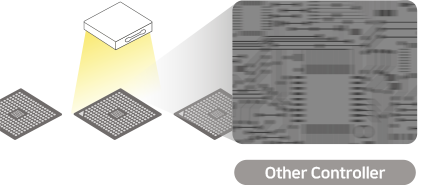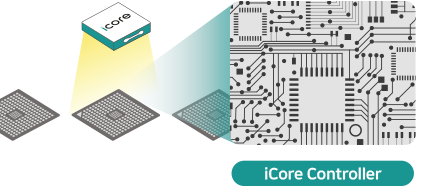Standard LED Strobe Controller
IP-1P1S-5C
- Minimum Pulse Duration 0.5㎲
- Sequence
- Auto Voltage
- High Power LED Available
Specification
| Model | IP-1P1S-5C |
|---|---|
| Interface | RS-485, RS-232 |
| No. of Channel | 1 |
| Min. Pulse width | 0.5㎲ |
| Max. Switching frequency | 300KHz |
| LED Voltage | 1V ~ 80V |
| Max. Power (Per Channel / Total) | 60W / 60W |
| Continuous Current | 5A |
| Pulse Current | 5A |
| Over-driving | X |
| Sequence control | O |
| No. of strobe controllers configurable | Max. 250 (Modbus Protocol) |
Function Introduction
Over-driving to maximize LED performance
iPulse is a constant current controller for LED lighting. The product utilizes the advantage of constant current driving to provide up to 10x Over-driving capability. Over-driving is a technology that instantaneously drives a current that exceeds the LED’s rated current to increase the LED lighting’s brightness by several times. iPulse can drive LEDs up to 200A, the highest in the industry, and assures constant LED current values at all times. It also has a built-in duration and duty ratio limiting function to protect LED elements.

Multistrobing imaging function with the sequence function
iPulse has a built-in sequence function to drive each LED channel sequentially with a trigger. Using the function, users can easily acquire multistrobing images. Users can designate up to eight sequences to individually control eight LEDs or control them differently by combining multiple LEDs. The product can acquire multiple images with a single-line scan camera without an expensive multispectral line scan camera.


Auto Voltage
- Real-time detection and supply of voltage needed for LED driving
- Reduction of heat generation by the controller
- Driving of voltage higher than the supply voltage
- Wide power supply selection

LED protection by automatically adjusting the current drive waveform
The main reason for LED damage is the heat generated by the LED. Using Over-driving can cause LED damage since it drives a higher current than the rated current. Therefore, users should be able to adjust the drive current waveform, i.e., the rate of LED being turned on, to create a condition for the LED to cool down. iPulse automatically controls the duty ratio (rate of LED being on) according to the drive current to protect the LED under any circumstances.

Fast current response
iPulse features a very fast current response even at high currents. LED drive is possible within 0.5㎲ after an external trigger input, and a current pulse as small as 0.5㎲ can be generated.It has the best performance in the industry and can benefit users in high-speed line scan and flying review applications..
Flying Inspection
iPulse’s Over-driving technology and fast response speed can drastically improve the flying review performance.
Because of the camera exposure time, filming a fast-moving object can result in a blur phenomenon in which the object appears blurry.
The minimum camera exposure time is around tens of ㎲ and can be a critical disadvantage for special applications.
iPulse’s Over-driving function can reduce the lighting exposure time to 1㎲ and drive the instantaneous current up to 200A.
Users can benefit from the effect of eliminating blur and increasing image brightness simultaneously.









